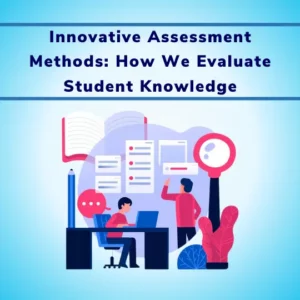Article Contents
Introduction
It was just another day at the prestigious university, where the administration was preparing for the interview phase of the admission process.
Every year, Dr. Sharma, who oversees student selection, must sift through thousands of applications and conduct hundreds of interviews to assess each candidate’s communication skills and determine their suitability for admission.

However, with the advent of generative AI technology, this laborious process could be significantly streamlined.
Automating the interview process would not only simplify life for both students and the admissions committee but also revolutionize the way universities handle their admissions.
Every academic year, admission committees are tasked with conducting hundreds of interviews to evaluate student applicants and determine suitable candidates for admission.
On an average Interview Committee members spend 30 to 45 minutes during Personal Interview of the Applicant for the Admission process
Source: National Association for College Admission Counseling
But what if this process could be automated using cutting-edge technology?
Indeed, generative AI-based systems can effectively streamline the student selection process by automating the entire interviewing procedure.
With AI, the admission committee can define specific selection criteria, and the AI-powered interviewing system will act accordingly.
This innovative approach allows for the evaluation of students’ communication skills, domain knowledge, and various other aspects associated with the admission process.
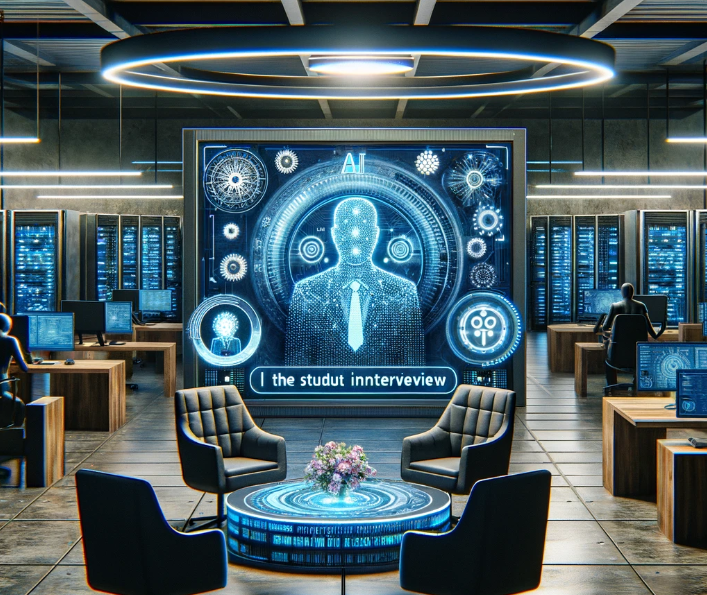
In this discussion, we will delve into how generative AI can revolutionize the interviewing process within the admissions landscape.
Current Challenges in Admission Interviews
Now, let us delve into the challenges surrounding the current admission interview process.
In the traditional approach, universities and academic institutions typically follow several steps: accepting applications, shortlisting candidates, and conducting interviews. This method is particularly relevant for higher education courses such as management programs and even PhD courses.
The process, while seemingly straightforward, can present its fair share of obstacles. So, let us explore these challenges and perhaps uncover a witty solution or two along the way.
Typically, the interview process for admissions committees involves deploying multiple interviewers to evaluate various aspects of an applicant.
This can be quite time-consuming, and as a result, some universities employ essay writing methods. In this approach, candidates are asked to compose essays that are assessed for uniqueness, creativity, and the ability to express their thoughts.
In addition to written essays, one-on-one interviews are also conducted.
However, there are several limitations associated with these traditional processes, including a lack of scalability.
Imagine assessing hundreds of student applicants during an admission cycle; it would require numerous interviewers who must manage their schedules alongside those of the university and students. Furthermore, the involvement of humans can introduce bias into the process.
Technology has the potential to play a pivotal role in improving the overall aspects of conducting admission interviews by addressing these issues. By streamlining the process and reducing human intervention, technology can help make the interview process more efficient and unbiased.
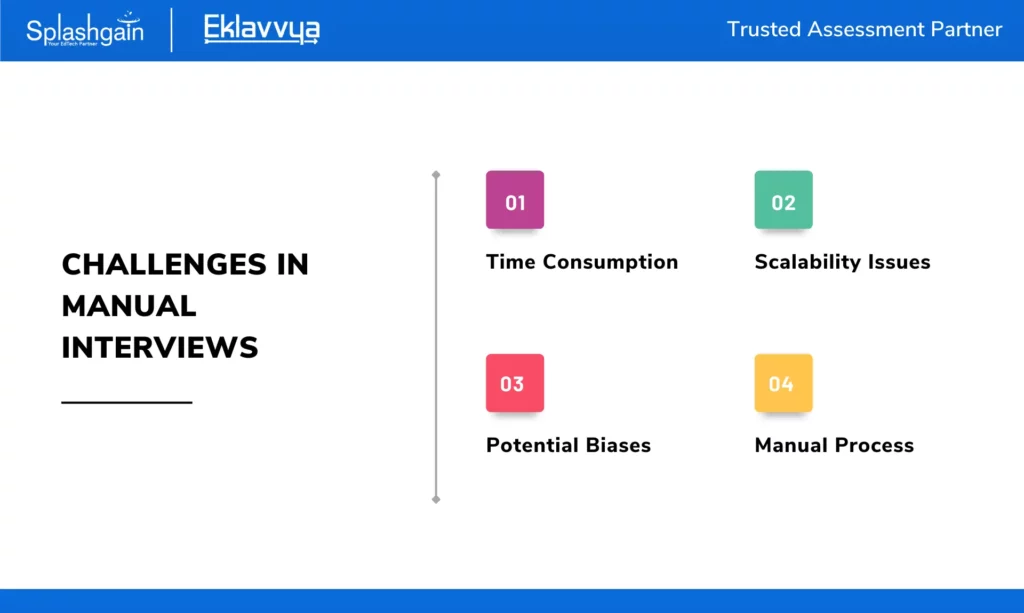
The Role of Generative AI in Revolutionizing Interviews
Now, let’s discuss Generative AI – an advanced technology that employs sophisticated machine learning algorithms to create content creatively.
This remarkable tool can generate content in various forms, including text, audio, and video. By providing specific input, the Generative AI will produce a unique set of content tailored to your needs. Furthermore, it can evaluate existing content and offer comprehensive feedback based on your instructions.
Generative AI’s potential extends to processing content related to text, audio, or video. Let’s explore how this technology can streamline the interview process for admission committees.
Writing Skill Assessment
First, consider assessing writing skills or written communication capabilities. In this context, you can employ a Generative AI-based assessment method where candidates are asked to write an essay on a specific topic or provide an opinion on a case study.
The Generative AI will then evaluate the writing in terms of problem-solving practicality, communication capability, and writing skills.
Additionally, it assesses grammar and generates an automated skill rating for the user.
Should you need to evaluate written communication capabilities, look no further than Generative AI-based writing assessments.
Capable of conducting hundreds or even thousands of evaluations concurrently, this tool is well-suited for situations where numerous candidates vie for limited admission slots.
By incorporating Generative AI-based writing assessments into your admission process, you can efficiently shortlist suitable applicants with excellent communication skills.
Automating the personal interview process.
It leverages advanced algorithms to evaluate candidate’s responses, not just for content, but also for nuances in communication skills and body language. This approach allows for a more in-depth and objective assessment of each candidate.
Analyzing Communication Skills and Body Language
One of the critical advantages of using Generative AI is its ability to analyze verbal and non-verbal cues. By examining factors such as speech patterns, eye contact, and gestures, AI can provide insights into a candidate’s confidence, enthusiasm, and overall demeanor during the interview.
Bias-Free, Comprehensive Candidate Assessment
Generative AI operates on predefined parameters, ensuring that each candidate is evaluated on the same criteria, thus minimizing human biases. This results in a more equitable assessment process where candidates are judged purely on their merits and abilities.
Enhancing Scalability and Efficiency
With Generative AI, institutions can conduct thousands of interviews concurrently, a feat impossible with human interviewers.
This not only speeds up the admission counseling process but also allows institutions to reach a wider pool of candidates.
Steps of Conducting AI Interview
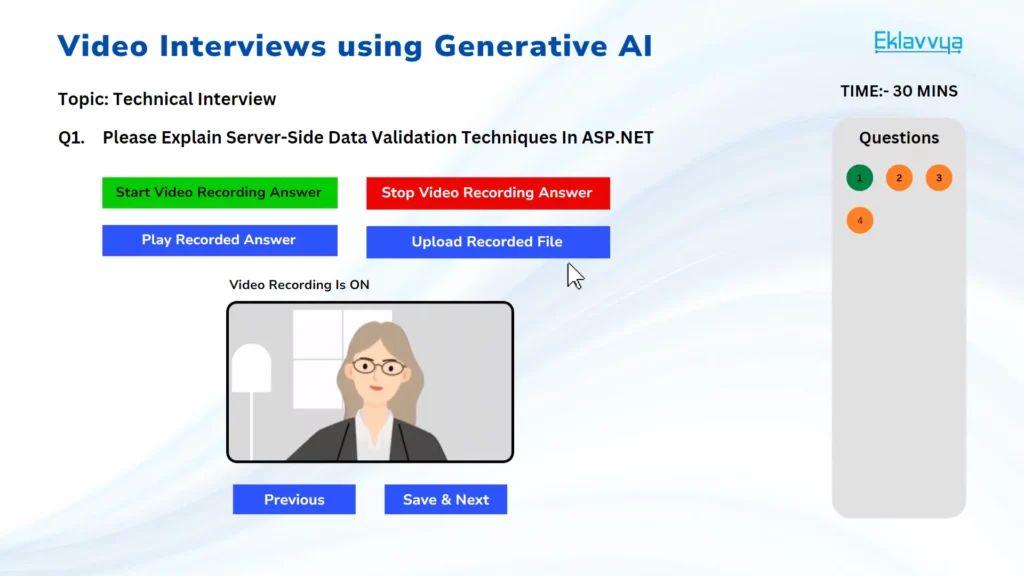
- User is shown questions on the screen and ask to record video of the response
- Video is uploaded in the system for question response
- AI analyzes video content/ context to rate user response
- User can attempt questions shown on the screen and submit all responses
- AI would come up with rating, it would compare responses with model answers or standard responses.
- Evaluation of hundreds of users become easy with AI based interview technique.
Comparison of Traditional Vs AI Interviewing
| Aspect | Normal Interviewing | AI Interviewing |
| Interview Conduction | Interviewer is needed to conduct the interview | Generative AI technology can conduct the interview |
| Interview Capacity | Only one interview at a time with a manual process | Thousands of interviews can be conducted concurrently |
| Cost and Time Efficiency | High cost and time involvement | Very cost-effective with minimal human time required |
| Bias | Potential for personal or cultural bias | No personal or cultural bias during the process |
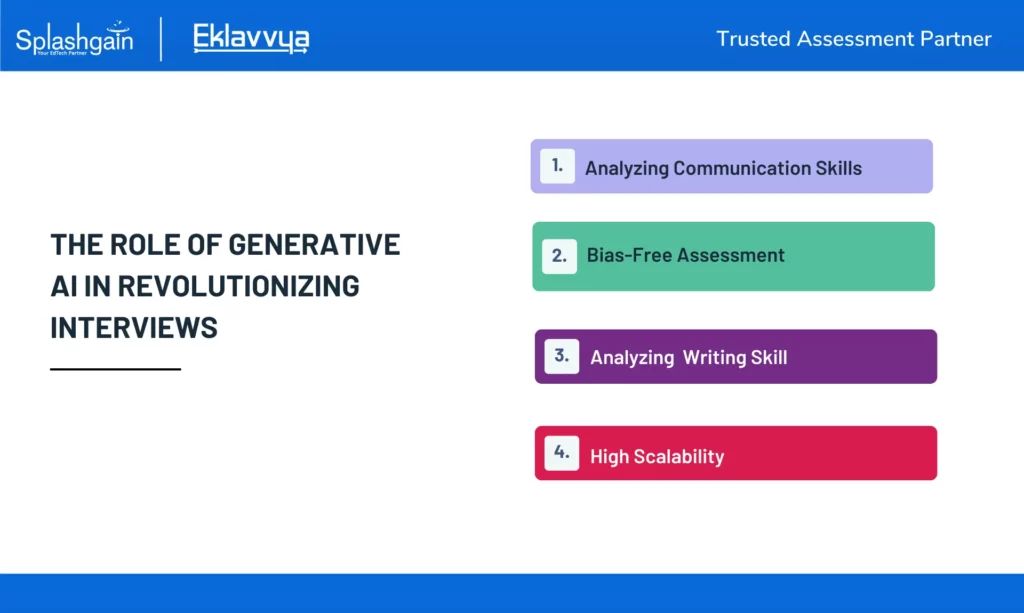
Implementation of Generative AI in Admission Counseling
Let us explore the implementation of a generative AI admission Counseling process, complete with an AI-driven interview round.
The first step involves technology integration. Platforms such as Eklavvya provide facilities for conducting AI-based writing assessments and AI-generated interviews.
By integrating an AI system with your existing admission process, you can efficiently schedule writing skill assessments and interview sessions according to candidate preferences.
The platform offers a scheduling feature that accommodates bulk scheduling for thousands of candidates to concurrently participate in writing skill assessments and AI interviews.
Additionally, the platform includes an automated proctoring process that captures the candidate’s surroundings and utilizes a secure exam browser to conduct AI interviews effectively.
The system saves each candidate’s answers and responses, allowing generative AI to generate unique evaluation ratings.
These ratings can be used to shortlist suitable students for your admissions process and to take further action accordingly.
By implementing API-based integration with generative AI assessments, you can automate and simplify the interviewing process, saving thousands of man-hours typically spent by interviewers or admission committees.
This cost-effective method allows the committee to focus on other productive activities while minimizing expenses for the interviewing process.
All answers and responses are stored in the system for future reference. If you need to audit, evaluate AI capabilities, or review a student’s historical performance during the admission interview process, the information is readily available within the system.
In summary, setting up a generative AI-based interviewing process is a simple task achieved through an API-driven method, enabling you to get started quickly and efficiently.
Training Staff for AI-Enhanced Operations
While AI plays a significant role, human oversight remains crucial. Staff must be trained in the implementation of AI interviewing process and the overall monitoring process.
Training and collaboration can make technology adoption successful for any education institution.
Conclusion: The Transformative Potential of AI
The integration of Generative AI in admissions process of educational institutions, particularly for management education, marks a significant leap forward.
By automating personal interviews, this technology not only streamlines the admission process but also ensures a more fair, unbiased, and inclusive assessment of candidates.
While challenges such as data security and the need for a balance between AI and human judgment remain, the potential benefits are immense. Generative AI is poised to transform admissions, making them more efficient, scalable, and equitable, thereby shaping a more inclusive future for education.
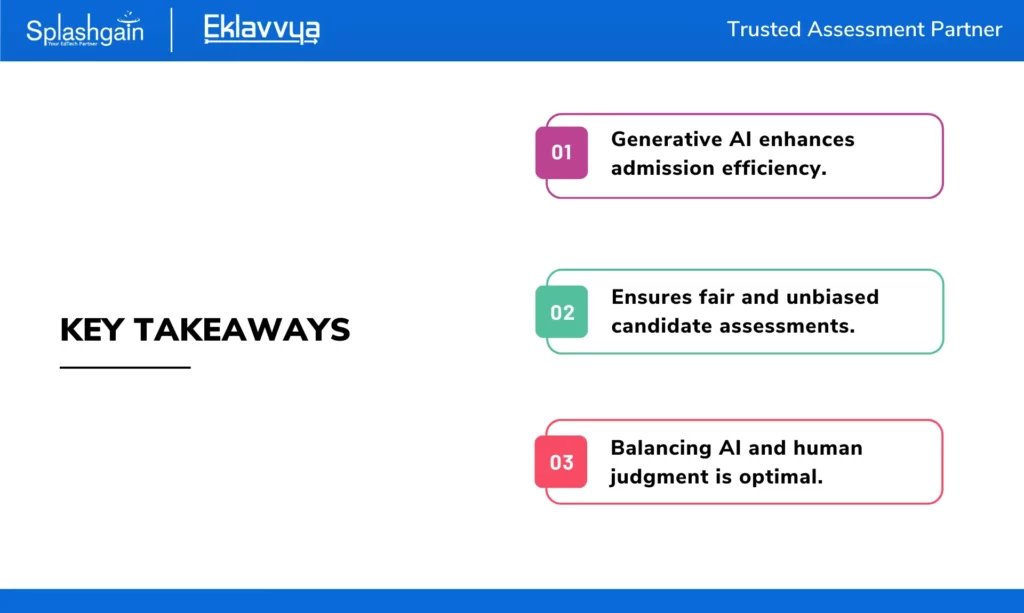

FAQ
How to Maintain fairness in the admission process?
Generative AI systems are designed to evaluate candidates based on objective criteria, reducing human biases. By analyzing responses using predefined metrics, these systems ensure that all candidates are assessed equally, based on their merits.
Can Generative AI completely replace human interviewers?
While Generative AI significantly enhances the efficiency of the interview process, it is not intended to entirely replace human interviewers. The optimal approach combines AI analysis with human insight for final decision-making.
How does Generative AI handle different communication styles?
Generative AI is trained on a wide range of data, allowing it to understand and assess various communication styles. It can adapt to different speech patterns, accents, and expressions, ensuring a fair assessment for all candidates.
What measures are taken to protect candidates’ privacy in AI-powered interviews?
Institutions implementing Generative AI in admissions prioritize data security and privacy. They adhere to strict data protection policies and use encryption and other security measures to safeguard candidates’ information.
How can institutions prepare for integrating Generative AI into their admission processes?
Institutions should start by understanding the capabilities of Generative AI and aligning their admission criteria accordingly. Training staff and setting up the necessary infrastructure are also crucial steps in this integration.
Are there any limitations to using Generative AI in admissions?
Like any technology, Generative AI has its limitations. It may not fully capture the nuances of human interaction, and its assessments are as good as the data and algorithms it relies on. Continuous updates and human oversight are essential to address these limitations.


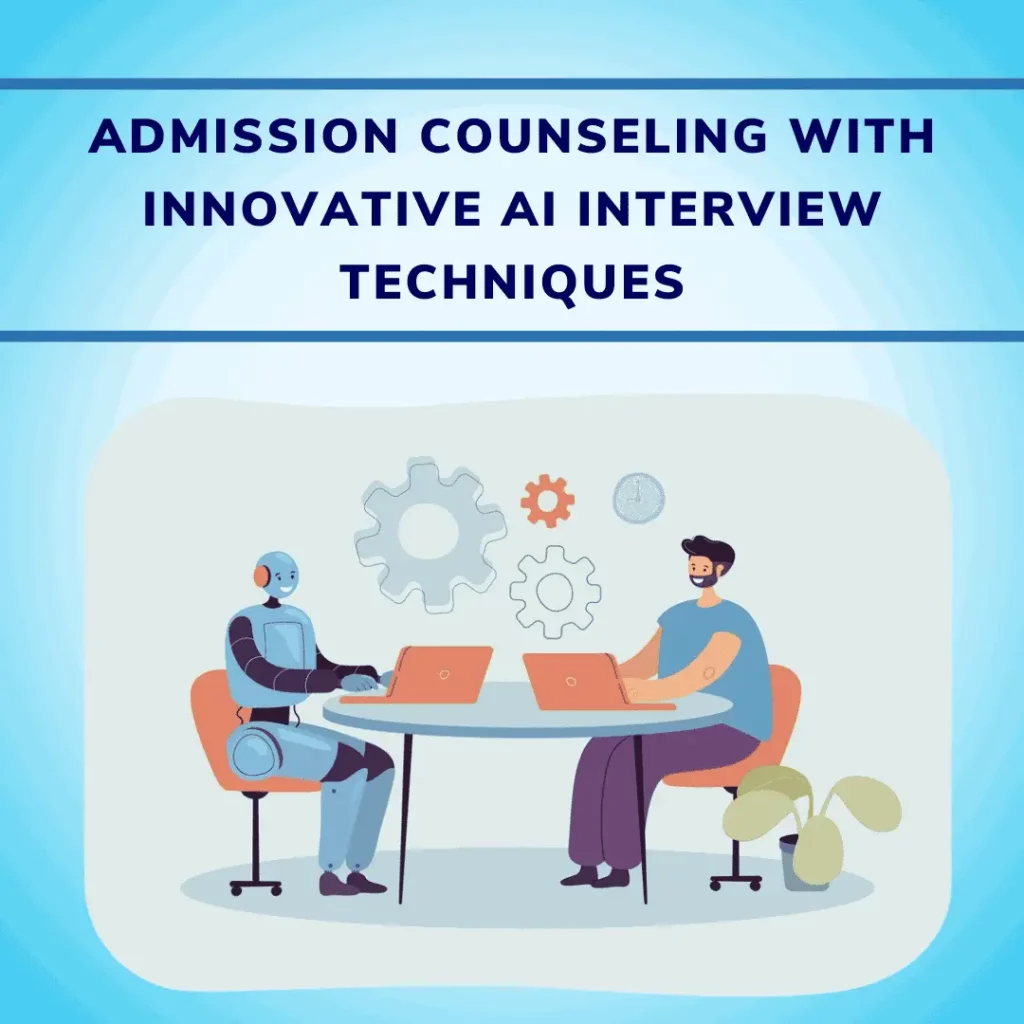

![How Government-Led Exams at 250+ Locations Are Setting New Standards of Integrity [Case Study]](https://www.eklavvya.com/blog/wp-content/uploads/2024/04/Enhancing-Exam-Integrity-Government-Certification-in-250-Locations-150x150.webp)
![Transforming Central Govt. Exams Evaluation: How Onscreen Marking is Leading the Charge [Case Study]](https://www.eklavvya.com/blog/wp-content/uploads/2024/04/How-Onscreen-Marking-Revolutionized-Central-Govt-Exams-Case-Study-1-150x150.webp)
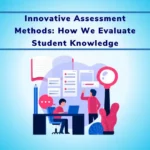
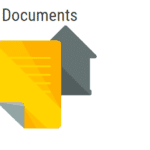

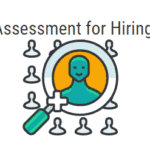









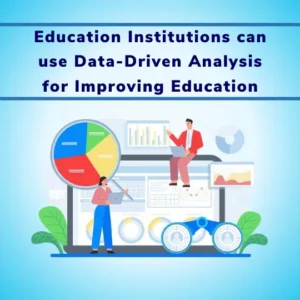

![How Onscreen Marking Revolutionized Central Govt Exams [Case Study]](https://www.eklavvya.com/blog/wp-content/uploads/2024/04/How-Onscreen-Marking-Revolutionized-Central-Govt-Exams-Case-Study-1-300x300.webp)
